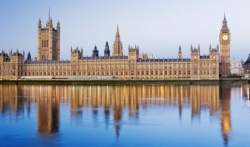 This month we are doing something a little different and looking at the big picture so far as English law is concerned. This is something that is covered in the first unit of ILSPA's Legal Secretaries Diploma so that students can get a good grasp of how English laws are created. By knowing something about the ‘big’ picture, you are showing an interest in the same thing that intrigues many lawyers.
This month we are doing something a little different and looking at the big picture so far as English law is concerned. This is something that is covered in the first unit of ILSPA's Legal Secretaries Diploma so that students can get a good grasp of how English laws are created. By knowing something about the ‘big’ picture, you are showing an interest in the same thing that intrigues many lawyers.
Diploma graduates will already know that most new laws in the United Kingdom are made by Parliament. There is a concept known as Parliamentary supremacy which, as the name suggests, makes laws made by Parliament very near the top in terms of importance. So what influences our supreme lawmakers’ decisions to make new laws or get rid of old laws? If you want to know more about Parliament as an institution, then we recommend you visit their website (www.parliament.uk), which has a wealth of information, videos and even games.
The Government
The most important influence on new law creation is the government you vote for. During the next general election you will no doubt hear many promises being made by the various political parties. These promises are usually contained in a party’s manifesto, which is their plan for new laws if they are elected. After the party is elected, the plan is announced to the country in the Queen’s speech at the opening of Parliament. The full parliamentary process is considered in depth in the Diploma course when studying the English legal system and involves more detail than we are able to cover in this article.
European Law
In addition to laws being created because the government wants them, there are occasions when a government is required to introduce a new law. This is because of our membership in the European Union. Examples of new laws (properly called Acts of Parliament) created because of the influence of Europe include laws on sexual discrimination, employment and consumer protection. European law and its influence on English law is a specialist area of study involving the legal theory on the separation of powers. This is beyond what many legal practitioners would deal with in day-to-day practice, and although of interest, it is beyond the scope of this article.
The Law Commission
In a previous Journal article, we wrote about the recent removal of hundreds of obsolete Acts of Parliament. This type of ‘maintenance’ of our laws is usually the function of the Law Commission, established in 1965. The commission is sometimes described as the lawyer’s lawyer, and they keep the law under review. They will prepare reports for the government on problems with the law and propose reforms Parliament should make. Originally one of the aims of the commission was to create a legal code for things like family law or the law of contract, but over the years they have only done this for small areas of law rather than suggested legal codes that cover all areas of law. Through the work of the commission, some very important laws have been created by Parliament. Amongst their greatest successes are the Unfair Contract Terms Act 1977, the Occupiers Liability Act 1984 and the Supply of Goods and Services Act 1982. As to failures, their 1985 report suggesting a criminal code should be introduced into UK law has never been heard by Parliament.
The Media
One final influence that affects the creation of new laws is the one you most likely already know about: the media and pressure groups. When you read an article in the newspaper or hear a news story on the TV, you are potentially influencing the laws that may be made in the future. Your interest in a news story is something that politicians sometimes take notice of. If there is a public outcry over an issue, the public (you) may demand a change in the law. In recent years, examples of where this has happened include:
- The Dangerous Dogs Act, following the death of several small children savaged by dogs
- The formation of the sex offenders register, following the tragic death of a child at the hands of a paedophile
- The ban on smoking in public places following years of lobbying by pressure groups such as the British Medical Association
As you may now see, the development of the law in this country is influenced by many different bodies. Next time you hear the news or read a newspaper article announcing the creation of a new law, you may be able to pause and consider who is actually behind the idea in the first place.
Join the Institute of Legal Secretaries and PAs (ILSPA) and stay informed on the latest developments in law and legal matters. As a Member, you’ll gain access to exclusive resources, industry updates, and valuable insights to enhance your legal knowledge and advance your career. You can also take advantage of continuous learning opportunities to stay ahead in the ever-evolving field of law.
